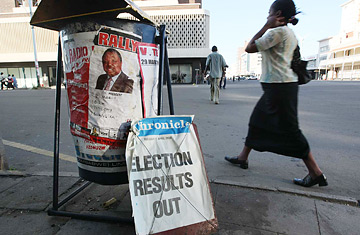
Tuesday's newspaper headline in Bulawayo, Zimbabwe
On Tuesday Zimbabwe entered its third day of waiting for the results of a general election amid mounting evidence that the opposition had narrowly defeated President Robert Mugabe — and increasing suspicion that his ruling regime was trying to rig the results. But as the delay continued, speculation grew over the reasons for manipulating the results.
Members of the opposition have two theories. The first is that Mugabe is trying to push himself over the 50% mark and win the election outright — though they say that is increasingly difficult given the amount of unofficial results indicating otherwise. The second theory is that the 84-year-old Mugabe, who has ruled Zimbabwe for 28 years, is trying to negotiate an exit. That is the more likely scenario, says David Coltart, a newly reelected member of parliament from Bulawayo. Speaking to TIME by phone, Coltart said, "It is increasingly clear that Mugabe has lost the support of the rank and file of the army and the police." The armed forces have become Mugabe's main support as his popularity plummeted amid the the country's economy disintegration. South Africa's Mail & Guardian is reporting negotiations between the opposition and Zimbabwe's military and security apparatus.
Nevertheless, Zimbabwe citizens say they will not be surprised if Mugabe finds a way to stay on. "Nothing is going to happen," says one resident of Bulawayo, who asked not to be named. "He is clinging to power because he has so much to lose." If Mugabe were to leave office, they point out, he could suffer the fate of Charles Taylor, the former President of Liberia, who is now awaiting trial in the International Criminal Court.
Officially, the Zimbabwe Electoral Commission has thus far released results for 131 out of the parliament's 210 seats. According to that preliminary count, Mugabe's Zanu-PF won 64 seats, while the opposition Movement for Democratic Change (MDC) won a total of 67. But five of those opposition seats went to a splinter faction that has broken off from the MDC and its leader, Morgan Tsvangirai, Mugabe's main rival.
The commission has yet to release any results on the presidential poll, held simultaneously on Saturday. The Zimbabwe Election Support Network, a non-governmental group, said a sample it conducted of 435 polling stations—5% of the total—showed Tsvangirai winning 49% of the presidential vote, Mugabe 41% and Simba Makoni, a former finance minister who split from Mugabe, 8%. If final results show that no candidate received more than 50% of the vote, Zimbabwe's electoral law would mandate a run-off between Tsvangirai and Mugabe within three weeks.
Mugabe was once a darling of Africa for his overthrow of white supremacist rule in what was then known as Rhodesia, and was praised in the West for Zimbabwe's excellent education system and relative prosperity. More recently he has become a failure and an embarrassment. Zimbabwe's economy has collapsed: unemployment is 80%, inflation is 100,000%, and up to 3 million Zimbabweans have fled the country. Mugabe regularly rails against homosexuals and a Western conspiracy to recolonize Zimbabwe. His regime is riven with corruption, with senior figures allotting themselves large tracts of farmland seized under Mugabe's anti-white land reform process. Wealth depends on political power in Zimbabwe, and in the run-up to the vote, senior regime figures, including the head of the army and the prison service, ordered their officers to vote for Mugabe and vowed that, even if he lost, the security services would continue to support him.
Now the delays in releasing the results have prompted speculation that the regime is attempting to fix the poll. There are ample grounds for suspicion: elections in 2000, 2002 and 2005 were marred by violence and rigging. In Washington on Monday, U.S. State Department deputy spokesman Tom Casey urged that the results be released. "The opportunities for mischief increase the longer the delay is between the elections and the announcement," he said. Earlier in the day, Secretary of State Condoleezza Rice described Mugabe as a "disgrace," while British Prime Minister Gordon Brown warned that the "eyes of the world" were on Zimbabwe. Most foreign observers and journalists have been banned from covering the election.
Aside from the slow drip of parliamentary results, there has been no word from the regime since Saturday's vote. Neither Mugabe nor Tsvangirai have appeared in public, nor released any statement. Senior ministers are also staying hidden and not answering their telephones. Riot police have been deployed on the streets of the capital, Harare. There have been no clashes so far, but the limbo in Zimbabwe leaves residents there, and observers abroad, anxious about how it will end. With reporting by Howard Chua-Eoan/New York
